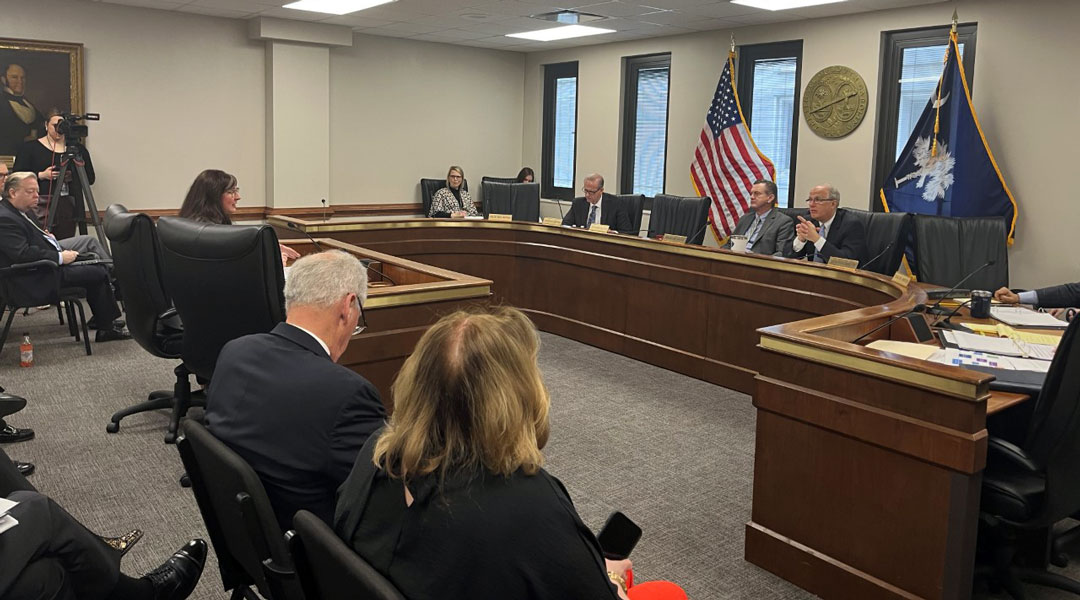Sara Goldsby, director of the Department of Alcohol and Other Drug Abuse Services, testifies before the Senate medical affairs committee. Goldsby was named director in 2018. (Photo by Wade Rainey)
Some government agencies and health advocacy groups raised concerns over a bill that would split DHEC into two organizations during a Senate subcommittee meeting Wednesday.
The proposed legislation would abolish the Department of Health and Environmental Control. It would form the Department of Behavioral and Public Health to handle health duties and move the agency’s environmental duties to existing agencies.
With more than 3,400 employees, DHEC is one of the largest state agencies in South Carolina, and for decades has been criticized as being slow and unwieldy.
DHEC’s environmental responsibilities would be delegated to the Department of Agriculture and the Department of Natural Resources.
During a committee meeting last week, DHEC officials Myra Reece and Edward Simmer discussed potential environmental benefits to splitting the department.
“Sometimes (the) environment perhaps doesn’t get the same attention it would if it was a separate agency,” Simmer said.
“We made such progress with environmental protections over the decades,” Reece said. “I think that you’ve seen a transition that you really need that commitment and that priority on environmental protection.”
Officials on the public health side are less convinced.
Sarah Goldsby, the director of the Department of Alcohol and other Drug Abuse Services, said that she worries her agency’s work will receive less emphasis if it is moved under a new public health department.
“I just think that it should be done carefully, so that a merger does not diminish the importance and the public perception of importance of addictions issues,” Goldsby said.
South Carolina is one of three states with a standalone drug and alcohol abuse agency, along with New York and Pennsylvania.
Goldsby also referenced a study conducted in states that merged their drug abuse department with a larger agency.
“In those 12 states …, the stakeholders did perceive a diminishment of the importance and the nature of the role of government in addressing these issues,” she said.
But Goldsby said that she thinks a merger could help her department’s workload, and that the agency could “make it work either way.”
Mental health advocates had similar concerns.
“My main concern as an advocate is how does this (legislation) make things better for those with mental illness?” Bill Lindsey, the executive director of the South Carolina chapter of the National Alliance on Mental Illness, said. “Does it improve the services of those with mental illness?”
“I can’t see where the legislation really enhances or makes it better,” he said.
Lindsey said that he worries that if the Department of Mental Health is absorbed into the proposed health agency, increased bureaucracy will make it harder for patients to receive care.
Other departments have different reservations.
Under the proposed legislation, the responsibility of operating veterans homes for those who need long-term care would be transferred from the Department of Mental Health to the Department of Veterans’ Affairs.
Todd McCaffery, the state secretary of Veterans’ Affairs, said he’s not sure his department has the proper staff to handle that responsibility.
“We have no employees currently who have a background at all in nursing home management – or any of the highly specialized fields that are associated with that,” he said.
McCaffery said he doesn’t think the state’s hospitals and homes should fall under the Department of Veterans’ Affairs.
“The term ‘veteran patient’ is a label on that particular patient, but it’s not significantly different than a patient in any other setting,” McCaffery said. “I think the focus ought to be on the patient.”
There will be one more committee meeting regarding the bill next week, featuring a summary presentation from DHEC and testimony from the Department of Administration.
The bill next would move to the Medical Affairs committee before it could move to the full Senate.



